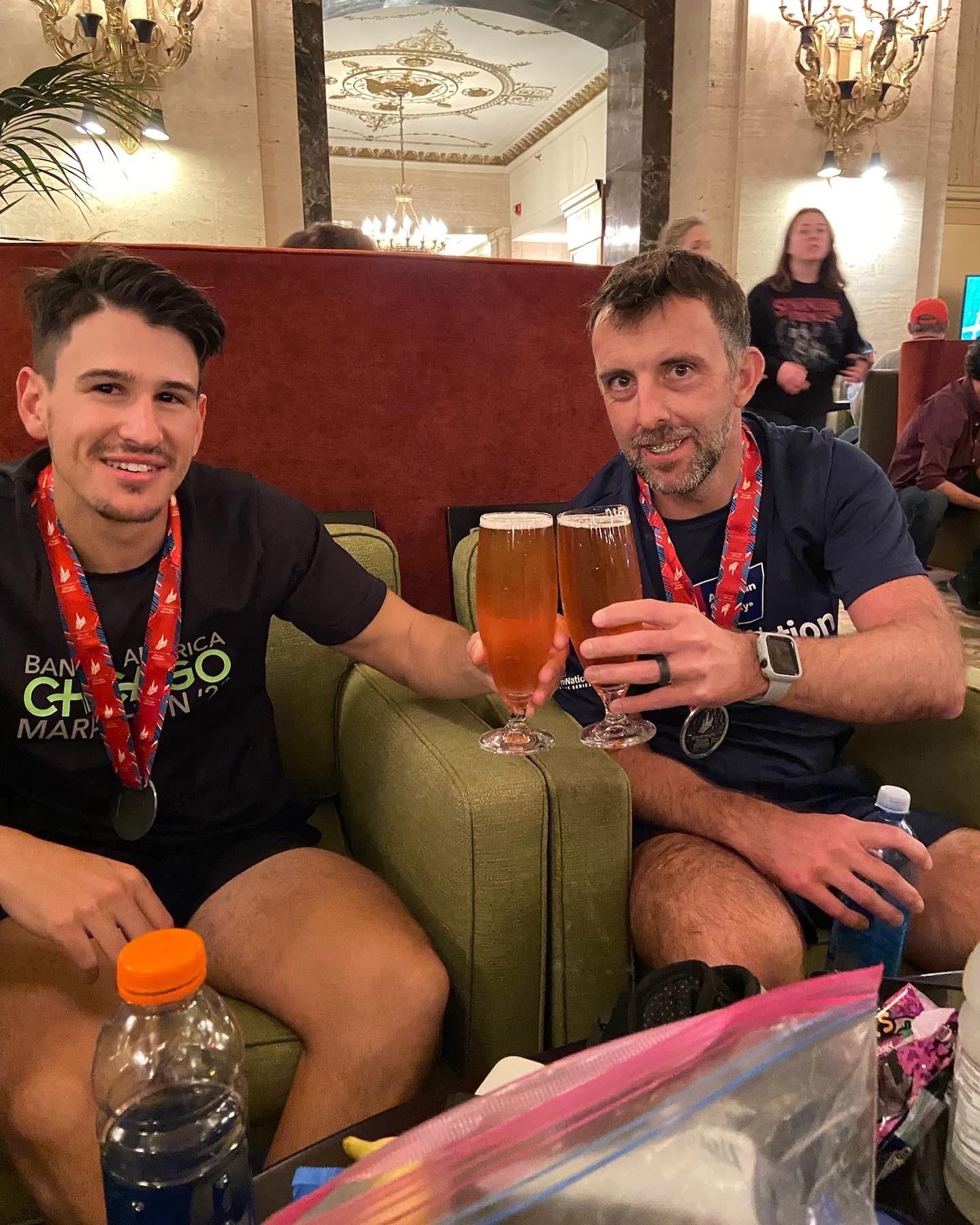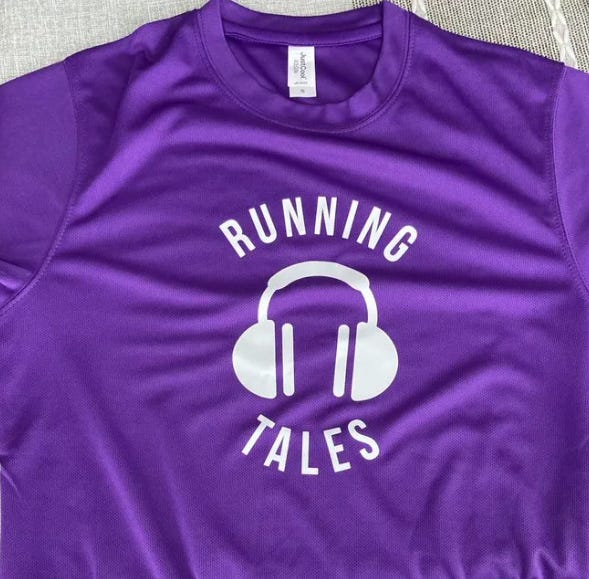Justin Cheesman: Leveraging running to empower communities
From baseball punishment to personal growth, Justin Cheesman has embraced the power of running to find constant challenges and enable charitable giving

Sometimes it seems as if every second social media post is an attempt by runners who wear the ‘right’ socks and train on a Tuesday to tell the rest of us we’re not good enough to take part in their sport.
Or, when the gatekeepers have gathered up their goos and headed out or monitor how tired Garmin thinks they are, a succession of memes - sometimes posted by the same corporate entities that yesterday solely championed going further and faster - remind us that a 45-minute 5k is the same as a 16-minute one. For the four-hundredth time that morning.
But every now and then, you come across a story which reminds you how running really can make the world a better place.
One such example is the story of Run It Back, and its creator Justin Cheesman.
Attracting runners from all over the world, the event - which takes place in South Africa every November - sees runners complete 5k-a-day for seven consecutive days.
This year will be the fifth time the event has taken place. The first Run It Back in 2021 raised R50,000 (approx £2,000/$2,800) - money that was used to buy a home for a foster mother.
Last year, Run It Back ‘24 brought in the same amount, with a pre-school teacher, Princess, being the beneficiary. The money empowered her to improve the school and the lives of the 30 children she teaches in Silver Town in Thembalethu.
The whole idea of Run It Back is to empower communities through running and improve people’s lives.
It is all a far cry from the days when Justin thought running had been designed to make his life worse.
‘It was a bitter hatred - running and I did not get along at all’:

As a collegiate baseball player, Justin had seen running as a punishment.
His quest to avoid it even went as far as heading behind a convenience store and splashing water on himself in an attempt to fool coaches into thinking he’d completed a run.
He said below-par performance on the baseball pitch would result in players having to run poles, a post-game penance that saw them made to sprint back and forth from foul pole to foul pole.
“We’d have to run those prior to even getting on the bus,” Justin said.
“Your teammates would be showered, on the bus, they'd be calling their family and getting ready to unwind for the trip back home, and you're still out there slugging away in you're running shoes.
“It was a struggle. Running for me was nothing I wanted to do at all.”
Justin said he was so famed among his peers for his dislike of running that he still gets calls and texts of disbelief from old friends when he posts his current runs on social media.
“It was a bitter hatred,” he added. “Those are strong words, but running and I did not get along at all.”
Justin’s relationship with running did not improve until he reached his 20s, and even then he had to be dragged into the sport by friends who constantly encouraged him of its worth.
By that time he had stopped playing baseball and knew he needed to balance the late nights out that a 20-year-old typically embraces with something more healthy.
Even then he took some persuading. When Saturday morning phone calls to his friends found them heading out for a run, Justin would hang up, asking them to call him back once they’d finished with such madness.
Eventually, though, it got to the point where enough people he knew and respected had made that Saturday morning run their ritual that he felt he had to join in.
One post-night out run, undertaken less than five hours after going to bed, sticks in his mind.
“My buddy told me I had no idea how good I’d feel afterwards,” Justin said.
“I think we did five miles and it just clicked to me that running is more than left, right, left, right. More than a way to sweat.
“I remember thinking this is more than a way to be fit or get active. It was the conversation in that five miles, whether that was recanting the night before or thinking maybe there is more to these runs, more to talk about, than simple bar tales.”
As the number of runs Justin took part in started to increase, the activity began to morph from one of recovery into a form a therapy and eventually of connection.
How running can be part of the relentless pursuit of better:

Although Justin’s primary running goal was social, the athlete in him wouldn’t be entirely silenced.
Those initial three to five mile runs became ten-milers and then half-marathons. Before he knew it, Justin was looking for fresh challenges and for events to enter.
These days his running resume is truly varied, featuring everything from the Chicago Marathon to the Goggins Challenge, a demanding endurance event created by ultra runner and former US Navy SEAL David Goggins which sees participants run four miles every four hours over a 48-hour period.
Along the way, he has completed events such as the Atlantic City Tri and the 12-person Palmetto 200 relay, as well as challenges including running 5km every day for 100 days during the coronavirus pandemic.
Justin said one of the aspects of running he most loves is the variety of ‘sports within the sport,’ with runs available over a huge host of distances and terrain.
“There’s no real ceiling to what you can do,” he said. “You have everything, starting with the traditional community 5K, then increasing your distances and even getting a little competitive internally.
“Then, you start to think about your time differentials beyond that. If you do get stale there's so many different events.
“I've run the Palmetto 200, which is a race here in South Carolina, where you run across the state. It's a relay that runs through the night and takes 25 to 30 hours to complete.
“There’s always something to chase. You never reach the end of a running interest or a running career.
“I just love that aspect of running and the community. The moment the guys you traditionally run with want to be done at the half-marathon distances, there’s 10 more people that would run a marathon with you and encourage you in that and train with you.
“For me, it’s that endless pursuit of challenging the body.”
Justin said the limits of the human body is something he’s always been obsessed with exploring.
He told Running Tales that discovering why people “shut it down” prior to reaching further, and how to overcome that, has spurred him on - and pushed him forward in his everyday life.
“For me, there’s always a pursuit of something better,” he added. “Whether that’s in a relationship, professionally, physically.
“There should always be something we're pursuing, whether that's the next race, the next opportunity that you have in front of you from a professional standpoint, or a better relationship with your wife or children.
“I like to have that relentless pursuit in all aspects of my life.”
A familiar story: From feeling like the greatest runner to not feeling his legs:
Justin said taking on the Chicago Marathon proved to be one of the biggest growth moments of his life - not just in terms of conquering running challenges, but as a further step towards using the sport for philanthropic purposes.
The race was his first marathon and he decided to run it to raise money for cancer awareness.
“My friend Josh’s dad had passed from cancer,” Justin said, “ and my personal mentor, who had helped me grow exponentially in my relationships and my faith, also had cancer at the time.
“So, I joined in that endeavour to raise money for cancer awareness.
“A marathon is a gamut of emotion. You start out hot, you're excited, and then as everyone that’s ever run one tells you, at miles 16 or 18, you're going to feel like you get hit by a bus.
“At mile 18, I was still going strong, and I was thinking, ‘I'm the greatest marathoner ever!’ And then at mile 20, everything at once hit me - from a little bit of emotion for why I was running and who I was running for to the emotion of, ‘wow, I can't feel my legs’.
“It was just this all encompassing moment when I realised running is so much more than running, than the left, right, left, right of it.
“There's a social impact piece, there's a relational piece. There's all of those emotions that you go through.
“At the end of that race, I went from ‘I’m never doing this again’ to ‘I can't wait to do something again’.”
Justin compared the process of competing tough races to the journey of life itself: “If you're not in a storm, one's coming.
“And if you've been through a storm, you can look back at that.
“That race for me was probably one of the most satisfying but also emotional pieces that I've had running.”
Run It Back and the 5k challenge which is bolstering communities in South Africa:
Although the Chicago Marathon helped to concentrate Justin’s mind when it came to the power of running, both in terms of personal development and as a tool to back vital causes, his first use of the sport for philanthropic purposes came during the Covid pandemic.
It saw him join forces with an organisation called Life Community Services, based in George, a city on South Africa’s Western Cape.
The group had been providing educational opportunities to children during South Africa’s Covid lockdown, concentrating on informal settlements and also looking to provide vital food to those who could no longer access or afford it.
Justin said: “Myself and a buddy of mine wanted to know what we could do.
“I was sat in South Carolina in the US [so it wasn’t obvious in terms of helping on the ground].
“We came up with this harebrained idea.”
That plan was to run five kilometres every day for 100 days, raising money for the charity along the way.
“We thought maybe one or two family members would get involved,” Justin said.
“Mum and Aunt Sally have to support you because they love you.
“We got individuals to sponsor each of these 5ks and they could run them with me if they wanted to.
“Here in South Carolina, we get some hot days and some people just wanted to see me run a 5K in 110 degree weather and see if I would live.
“We had some friends for whom that was the sole motivation.”
Incredibly, the fundraiser ended up making $10,000, allowing Life Community Services to feed people who were in drastic need at a time when the systems they would usually have relied on had all closed.
Justin said that after that initial success he and a number of friends “just started snowballing ideas”.
With the idea firmly in place that running was a platform that could be used to make a difference in the world, he started looking around for more ways to leverage what he calls the “common, shared heart” of the sport.
Shortly after the success of the 5k for 100 days fundraiser, Justin started a not-for-profit company called Empower alongside his wife, Kate, and their friends David and Brooke May, who are based in George and involved with Life Community Services.
“Empower ties really well into running, to being active and the idea of empowerment,” he said. “The idea of a platform that allows someone to overcome a barrier.
“I’ve seen that in running so often. The correlation has really been tremendous.”
With a strong goal to “eradicate unemployment and poverty in the community,” Empower has worked on housing and sustainable income projects in South Africa, as well as running educational programs for young entrepreneurs.
It also features a coffee company, Crown Coffee, which uses beans from Rwanda and Uganda. All profits from Crown go towards Empower’s projects developing entrepreneurs and investing in community champions.
And then there’s Run It Back. Seven days of 5km runs in the heat of Red Berry Farm in George on the Western Cape that appeals to people from all around the world.
“We had runners come from as far as Hong Kong,” Justin said.
“We had a few from the UK, a few in the US and a fair amount in South Africa, from Cape Town to Johannesburg to Durban to George.
“The aim is to run 5k a day for seven days. We encourage the runners to raise money, raise awareness for the organisation and then really, at the end, it's just to show the connectedness of a running world.
“We pick a community champion [as our beneficiary]. This past year we picked seven small businesses that we bought an inverter, which allows you to charge a battery that then can run your business load.
“Shedding is a huge issue in that area of South Africa - where for six to eight hours a day, they don't have power - so small businesses just don't have the ability to make a living and to grow their business during those hours.
“We want to come alongside of them and raise them up to overcome a barrier.”
Justin said many of the runners who take part in the event haven’t even completed one 5k previously, let alone seven in as a many days, so they are often also celebrating one of the biggest physical achievements of their lives.
He said: “It is just a powerful moment, seeing someone overcome a personal, physical barrier.
“But then that also contributes to someone else, who they might never meet, overcoming a professional, financial barrier.
“I just love that. We get the question all the time, ‘you are in South Carolina, why do you care about someone halfway around the world?’
“And for me, the ultimate sign of a charity, of a philanthropic endeavour, is the idea of changing someone's life that I'll never, ever meet.
“To do that through a running platform is amazing. We run every day. The question is how can we leverage that?”
One thing is for certain. The answers Justin Cheesman is exploring are far more attractive and purposeful than social media gatekeeping or virtue signalling.
Support Running Tales:
Please help us keep producing Running Tales across Substack and in podcast form:
Also on Running Tales:
Check out our merchandise:
Pretty in Purple: Be a part of the Running Tales revolution with our new merchandise range.
We’ve got buffs, caps, cups, t-shirts and hoodies - why not complete your next run as an everyday runner by doing extraordinary things?










So many great observations about running in this article. Thank you!